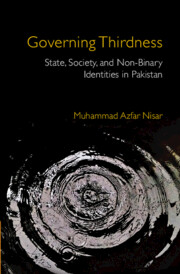Book contents
2 - Governing Thirdness through Religion, History, and Language
Published online by Cambridge University Press: 10 December 2021
Summary
There are multiple terms used to refer to the khawaja sira community in Pakistan, the most common in early academic literature being hijra, khusra, and khawaja sira. These terms have similar meaning in contemporary usage in Pakistani society and are generally considered umbrella terms that include all individuals who do not conform to their socially assigned gender or sexual identity. Within the khawaja sira community, however, these different terms are associated with significant internal discourses of authenticity that govern the identity, livelihood, and behaviour of the khawaja sira. As is documented most prominently by Faris Khan (2014) and Reddy (2005), there is a lot of internal tension within the khawaja sira community about their relative status vis-à-vis each other. As I discuss later, these terms are often used to communicate particular identity and status to both insiders and outsiders.
In terms of their usage within the khawaja sira community, the terms hijra and khusra are largely considered synonymous, with the latter being used more commonly by Punjabi speakers (most of my research participants). These terms are almost always invoked in comparison to the term zenana to claim authenticity and difference within the khawaja sira community. The label khusray (the plural of khusra) is usually reserved for individuals who have undergone surgical modification (generally genital excision of testicles and penis) of their body. This practice, which is increasingly becoming uncommon in Pakistan given the religious stigma associated with it, is much more common among Indian hijras (Reddy 2005) and considered a rite of passage to join the community. However, members of the khawaja sira community who identify as khusra generally claim to be born as intersex individuals and do not mention surgical modification of the body to outsiders. The khusray consider themselves to be the most authentic representatives of thirdness because they claim to be the only subgroup within the khawaja sira community that conforms to the traditional notions of authenticity and legitimacy about the khawaja sira identity. In doing so, the khusray reinforce the traditional notion that body is a major, if not the exclusive, site from which an authentic khawaja sira identity can be claimed.
- Type
- Chapter
- Information
- Governing ThirdnessState, Society, and Non-Binary Identities in Pakistan, pp. 20 - 36Publisher: Cambridge University PressPrint publication year: 2022

